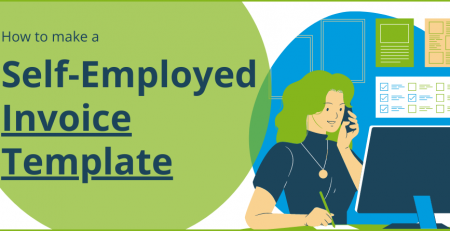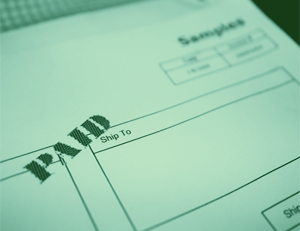Dealing With Debt: Steps To Take When Invoice Payment is Late
Few things provoke more frustration in freelancers than an unpaid, overdue invoices. They stand out on spreadsheets like a thundercloud in a sunny sky; threatening to rain on your financial security and demanding instant attention.
If you’re not used to late invoice payment – whether you’re a rookie to self-employment or are lucky to have loyal clients who settle their bills in good time – dealing with such instances can cause anxiety and add unwanted admin to an already hectic workload.
Fortunately, there are steps you can take to prevent overdue invoices from happening too often, and ensure you get paid promptly if a problem occurs.
1) Stay calm but assertive
Regardless of how your client is behaving and the reasons behind late invoice payment, being aggressive isn’t the way to win friends.
Of course, you should expect to be paid for work you’ve supplied. If you’ve done a good job they should be indebted to you – not in debt.
But there might be genuine, acceptable reasons for delayed payment – so your first job is to enquire what these are.
Your client could be awaiting payment from their own customers before releasing funds to you. Or it could simply be a case of overlooking your invoice in the first place.
It’s reasonable to be more assertive in making your point as time goes on; we’ll consider more formal procedures later.
2) Set invoice payment terms up front
As a way of guarding against the problem of late payment one of the most important actions you can take when you set up as self-employed is defining your payment terms.
You won’t necessarily avoid late invoice payment – but terms are an important parameter and draw a line in the sand, with customers understanding your expectations.
It’s important not to set payment deadlines that are too tight – seven days, for example – or leave too much room for manoeuvre, such as 90 days.
Therefore, 30 or 60 days are often preferable because this offers the most reasonable timeframe for your customers to settle invoices.
Related: Not sure how to structure your invoice, or just need a refresher? Check out our detailed invoice template for the self-employed.
3) Give a little more time on late invoice payment
If you’re fortunate and organised enough to have sufficient cash in the bank and more work in the pipeline, a week or two’s delay in payment shouldn’t make a huge difference.
In these circumstances it’s good to remain patient and follow a tried and tested process to gain payment.
Start with a simple, polite email – or attach a cover note to a duplicate invoice which can be forwarded via invoicing software – ideally to a contact in your customer’s accounts team, stating payment is overdue.
Clearly restate your terms and request an acknowledgement and prompt payment.
If more than one payment is late it may be worth creating and sending a statement of outstanding cost. And consider calling: it’s far easier to ignore emails than it is a direct question asked on the phone!
4) Consider new approaches
Being creative with payment terms becomes necessary when you’re discussing a long project and the customer wants to pay after it’s finished.
In this situation you’d be well within your rights to ask for part payment up front, though be prepared to negotiate what share you will received initially.
Meanwhile, you will get a feel over time whether a customer is a slow payer or generally difficult. If this happens and you think you may run the risk of being out of pocket, review existing and possible work to ensure you line up enough paydays to keep your cashflow healthy.
As this UK Government advice sets out, you might even consider charging interest if an invoice becomes overdue beyond a certain period; perhaps double the duration of your usual terms. Ensure you warn customers at the start of your relationship if you adopt this policy.
Healthy cashflow is critical to the success of your business. Hopefully the tips above have armed you with actions to take if financial frustrations occur. In our experience most late invoices are settled in good time and good faith with a friendly nudge (though, of course, if things still go wrong you may wish to consider a County Court action).
Visibility of unpaid invoices is key. With Cashflow Manager’s solutions you can track money owed by viewing detailed reports on prompt and late payers, outstanding amounts and due dates. You can also use our simple tools to send customers a statement.
Get paid on time by sending your customers professional reminders when payment of your invoices is overdue. Start your 30-day FREE trial today.












Leave a Reply